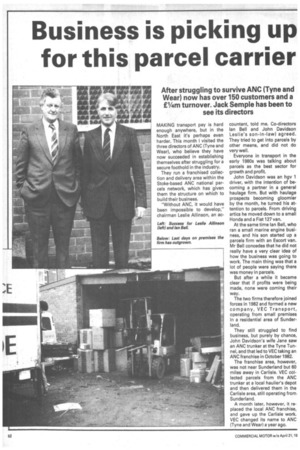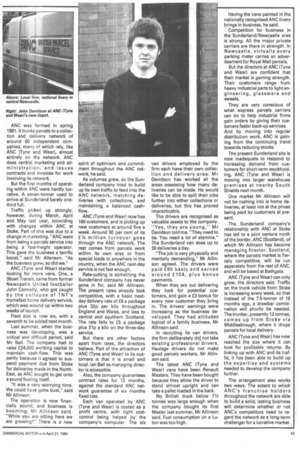Business is picking up for this parcel carrier
Page 54

Page 55

If you've noticed an error in this article please click here to report it so we can fix it.
After struggling to survive ANC (Tyne and Wear) now has over 150 customers and a E1/4m turnover. Jack Semple has been to see its directors
MAKING transport pay is hard enough anywhere, but in the North East it's perhaps even • harder. This month I visited the three directors of ANC (Tyne and Wear), who believe they have now succeeded in establishing themselves after struggling for a secure foothold in the industry.
They run a franchised collection and delivery area within the Stoke-based ANC national parcels network, which has given them the structure on which to build their business.
"Without ANC, it would have been impossible to develop," chairman Leslie Allinson, an ac countant, told me. Co-directors Ian Bell and John Davidson Leslie's son-in-law) agreed. They tried to get into parcels by other means, and did not do very well.
Everyone in transport in the early 1980s was talking about parcels as the best sector for growth and profit.
John Davidson was an hgv 1 driver, with the intention of be coming a partner in a general haulage firm. But with haulage prospects becoming gloomier by the month, he turned his attention to parcels. From driving artics he moved down to a small Honda and a Fiat 127 van.
At the same time Ian Bell, who ran a small marine engine busi ness, and his son started up a parcels firm with an Escort van. Mr Bell concedes that he did not really have a very clear idea of how the business was going to work. The main thing was that a lot of people were saying there was money in parcels.
But after a while it became clear that if profits were being made, none were coming their way.
The two firms therefore joined forces in 1982 and formed a new company, VEC Transport, operating from small premises in a residential area of Sunderland.
They still struggled to find business, but purely by chance, John Davidson's wife Jane saw an ANC trunker at the Tyne Tunnel, and that led to VEC taking an ANC franchise in October 1982.
The franchise area, however, was not near Sunderland but 60 miles away in Carlisle. VEC col lected parcels from the ANC trunker at a local haulier's depot and then delivered them in the Carlisle area, still operating from Sunderland.
A month later, however, it replaced the local ANC franchise, and gave up the Carlisle work. VEC changed its name to ANC (Tyne and Wear) a year ago. ANC was formed in spring 1981. It trunks parcels to a collection and delivery network of around 60 independent companies, many of which rely, like ANC (Tyne and Wear), almost entirely on the network. ANC does central marketing and administration, and issues contracts and invoices for work involving its network.
But the first months of operating within ANC were hardly lucrative. A seven-tonner used to arrive at Sunderland barely onethird full.
Traffic picked up strongly, however, during March, April and May last year, coinciding with changes within ANC at Stoke. Part of this was due to a change in marketing. "ANC went from being a parcels service into being a fast-freight operator. This gave the business a terrific boost," said Mr Allenson. "As the business grew, so did we."
ANC (Tyne and Wear) started looking for more vans. One, a 35cwt Transit, came from former Newcastle United footballer John Connolly, who got caught by the collapse of TNT's Homefast home delivery service, which was wound up within two weeks of launch.
Fleet size is now six, with a seventh to be added next month.
Last summer, when the business was developing, was a critical and difficult period, said Mr Bell. The company had to raise £24,000 working capital to maintain cash-flow. This was partly because it agreed to suspend payment due from Stoke for deliveries made in the NorthEast, as ANC sought to get onto a sound footing itself.
"It was a very worrying time. We could have gone bust," said Mr Allinson.
The operation is now financially sound, and business is booming, Mr Allinson said. "While you are sitting here we are growing I" There is a new spirit of optimism and commitment throughout the ANC network, he said.
As volumes grew, so the Sunderland company tried to build up its own traffic to feed into the ANC network, matching deliveries with collections, and maintaining a balanced cashflow.
ANC (Tyne and Wear) now has 160 customers, and is picking up new customers at around five a week. Around 90 per cent of its E1/4 million turnover goes through the ANC network. The rest comes from parcels work within its own area or from special loads to anywhere in the country, when the ANC next-day service is not fast enough.
Rate-cutting is something the Sunderland company has never gone in for, said Mr Allinson. The present rates already look competitive, with a basic nextday delivery rate of £8 a package plus 32p per kilo throughout England and Wales, and less to central and southern Scotland. The rate falls to £5 a package plus 21p a kilo on the three-day service.
But there are other factors apart from rates, the directors believe. Part of the attraction of ANC (Tyne and Wear) to its customers is that it is small and local. Ian Bell as managing director is accessible.
Also, the company guarantees contract rates for 12 months, against the standard ANC network guarantee of six months fixed rate.
Each van operated by ANC (Tyne and Wear) is costed as a profit centre, with tight costcontrol being helped by the company's computer. The six van drivers employed by the firm each have their own collection and delivery area. Mr Davidson has worked all the areas assessing how many deliveries can be made. He would like to be able to split their jobs further into either collections or deliveries, but this has proved impracticable.
The drivers are recognised as valuable assets to the company. "Yes, they are young," Mr Davidson told me. "They need to be. You need a lot of stamina." The Sunderland van does up to 30 deliveries a day.
"The job is very physically and mentally demanding," Mr Allinson agreed. The drivers were paid £95 basic and earned around El 0 4, plus bonus payments.
When they are out delivering they look for potential customers, and gain a £3 bonus for every new customer they bring in. The drivers' earnings were increasing as the business developed. They had attitudes typical of a family business, Mr Allinson said.
In recruiting its van drivers, the firm deliberately did, not take existing professional drivers. Haulage drivers do not make good parcels workers, Mr Allinson said.
The latest ANC (Tyne and Wear) vans have been Renault Masters. They have been bought because they allow the driver to stand almost upright and can take a pallet loaded in the back.
No British truck below 71/2 tonnes was large enough when the company bought its first Master last summer, Mr Allinson said. Fuel consumption on a Luton was too high. Having the vans painted in the nationally recognised ANC livery brings in business, he said.
Competition for business in the Sunderland/Newcastle area is strong. All the major private carriers are there in strength. In Newcastle, virtually every parking meter carries an advertisement for Royal Mail parcels.
But the directors at ANC (Tyne and Wear) are confident that their market is gaining strength. Their customers range from heavy industrial parts to light engineering, glassware and sweets.
They are very conscious of what express parcels carriers can do to help industrial firms gain orders by giving their customers faster back-up services. And by moving into regular distribution work, ANC is gaining from the continuing trend towards reducing stocks.
The present Sunderland site is now inadequate to respond to increasing demand from customers for short-term stockholding, ANC (Tyne and Wear) is moving into larger warehouse premises at nearby South Shields next month.
One market Mr Allinson will not be rushing into is home deliveries, at least not at the prices being paid by customers at present.
The Sunderland company's relationship with ANC at Stoke has led to a joint venture north of the border, ANC (Scotland), of which Mr Allinson has become managing firector. Scotland, where the parcels market is fiercely competitive, will be run separately from the rest of ANC, and will be based at Bathgate.
ANC (Tyne and Wear) can only grow, the directors said. Traffic on the trunk vehicle from Stoke is increasing every week, so that instead of the 7.5-tonner of 18 months ago, a drawbar combination will shortly be needed. The trunker, presently 12 tonnes, comes up from Stoke via Middlesbrough, where it drops parcels for local delivery.
ANC (Tyne and Wear) has now reached the size where it can look for profitable returns. By linking up with ANC and its traffic, it has been able to build up the expertise and systems needed to develop the company further.
The arrangement also works two ways. The extent to which ANC's franchise holders throughout the network are able to build a solid, lasting business will determine whether or not ANC's competitors need to regard the network as a long-term challenger for a lucrative market.




















































































